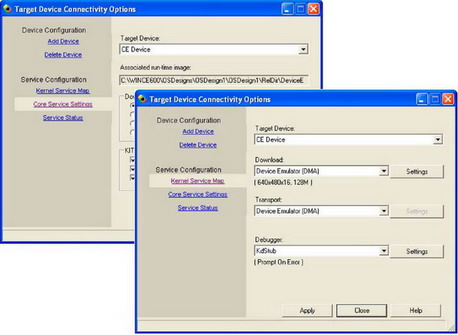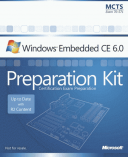Книга: Microsoft Windows Embedded CE 6.0 Exam Preparation Kit
KITL
KITL
As illustrated in Figure 4-1 at the beginning of this chapter, KITL is an essential communication layer between the development computer and the target device and must be enabled for Kernel Debugger support. As the name implies, KITL is completely hardware independent and works over network connections, serial cables, Universal Serial Bus (USB), or any other supported communication mechanism, such as Direct Memory Access (DMA). The only requirement is that both sides (development computer and target device) support and use the same interface. The most common and fastest KITL interface for the device emulator is DMA, as illustrated in Figure 4-7. For target devices with a supported Ethernet chip, it is typically best to use the network interface.

Figure 4-7 Configuring the KITL communication interface
KITL supports the following two methods of operation:
? Active mode By default, Platform Builder configures KITL to connect to the development computer during the start process. This setting is most useful for kernel and application debugging during the software-development cycle.
? Passive mode By clearing the check box Enable KITL on Device Boot, you can configure KITL for passive mode, meaning Windows Embedded CE initializes the KITL interface, but KITL does not establish a connection during the startup process. If an exception occurs, KITL makes an attempt to establish a connection to the development computer so that you can perform JIT debugging. Passive mode is most useful when working with mobile devices that do not have a physical connection to the development computer at startup.
NOTE
KITL modes and boot arguments
The Enable KITL on Device Boot setting is a boot argument (BootArgs) that Platform Builder configures for the boot loader. For more information about boot loaders and their advantages during the BSP development process, see the section "Boot Loaders" in the Windows Embedded CE 6.0 Documentation, available on the Microsoft MSDN Web site at http://msdn2.microsoft.com/en-us/library/aa917791.aspx.




